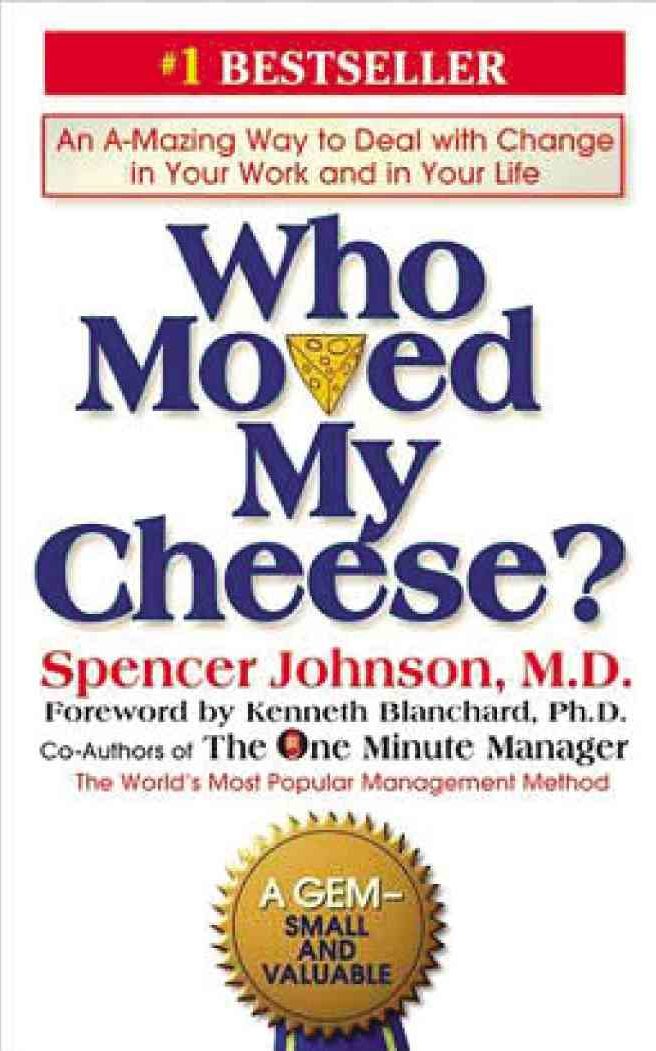You cannot have your cheese and eat it too!
“Who moved my Cheese”
Spencer Johnson, M.D.,
G.P. Putnam’s Sons
Updated edition
Some 17 years ago, I wrote a review of then a newly minted book titled “Who Moved My Cheese?” My book review was published by the Inquirer, on July 23, 2000 to be exact.
The author, Dr. Spencer Johnson, passed away recently, and this revisiting of his masterpiece should serve as a tribute to him, who created this simple, heartwarming modern-day parable for us 21st century creatures.
I wrote then—and I haven’t changed my mind—that the book, “Who Moved My Cheese?” is a charming modern day fable that portrays the silliness and foibles of little men—aptly called “Hem” and “Haw”—and shows us how we can learn a lesson or two from a tandem of mice named “Sniff” and “Scurry”—who, for their own good—are saved by their acts of “sniffing” and “scurrying.”
The gist of the story says that, one day, the two little men and the two mice wake up to discover that their giant cheese—that has been their food and reason for existence—is no longer there.
To the little men—Hem and Haw—the cheese suddenly disappears. To the two mice, the cheese is no longer around because, yes, “they cannot have their cheese and eat it too”—to paraphrase a wise saying.
I wrote: The author, Spencer Johnson—co-author of Kenneth Blanchard in the highly popular “The One Minute Manager”— has made sure he gave us hints on the character of the four creatures. Sniff and Scurry are in the never-ending activity of noting scents of cheese and of constantly running around. Hem and Haw, in contrast, are in the blissful state of believing that their “cheese” will be there forever, and are thus completely unprepared for a situation when the cheese disappears.
The turning point of the story is when the Cheese at Station C disappeared.
The two little people are unprepared for what they find. “What! No Cheese?” Hem yells. He continues yelling, “No Cheese? No Cheese?” as though if he shouts loud enough someone would put the cheese back.
“Who moved my Cheese?” he hollers. Finally, he puts his hands on his hips, his face turns red, and he screams at the top of his voice, “It’s not fair!”
Hem jumps to conclusion—that someone has “moved” his cheese, and so Hem unconsciously rules out the possibility that it was he and haw, and the two mice who have consumed the cheese.
Blinding themselves to reality
I did not say this in my first review in July 2000, and now I say it: When we jump to conclusions, we instantly blind ourselves from looking at all angles of the problem. When we point the blame to others, we fail to consider that it could be us who might have caused the problem. And, as we know it now: When we identify the real problem, such problem is half-solved!
In this slim book, the truth unsettles. Mice, by simply trusting their instincts, find and get what they want (a big piece of cheese!) faster than humans. The little men in this parable are paralyzed by analysis, are immobilized by complaints that “life is unfair,” are downed by self-pity, and are distracted by blame-throwing, directed—not at themselves—but at others.
I wrote then: We people are slowed down by needless baggage, by a “settler” mentality, and by our preoccupation with social standing. The two mice responded one way.
Narrates the author: They weren’t surprised. Since Sniff and Scurry had noticed the supply of cheese had been getting smaller every day, they were prepared for the inevitable and knew instinctively what to do.
One detail escaped me the first time I read and reviewed this book.
It is the obvious fact that the erstwhile giant cheese was getting smaller and smaller. And the two little men and the two tiny mice are consuming the cheese, bit by bit.
The mice never doubted that someday the cheese will be completely consumed. The little men were oblivious to what was going on.
Some 17 years after the book was published, the book remains up to date, as fresh as ever with layers of meaning.
When an editor friend read my review in 2000, she admitted that she found herself crying. She felt the inestimable loss of something precious, of something meaningful in one’s existence.
A colleague said the book was truly a modern day parable, an earthly story with a heavenly meaning. We go on existing, carelessly exploiting the resources we have—including our own health and wealth— and suddenly we find ourselves empty of such resources.
After some years in 2000, when my first review was published by the Inquirer, celebrity daughter Kris Aquino obviously discovered the book, had talked about it many times in her talk shows—and found herself and her friends relating intimately to the meanings of the parable. In fairness, as she was wont to say, the book had become more popular in the Philippines because of her.
The two rodents in this book are better decision makers due to their simplistic thinking process, as contrasted to the two rat-sized men who are caught in a complex web of issues and concerns.
Sounds familiar?
The author, a medical doctor, knows us fellow humans only too well. No wonder, the mice were destined to get to another Cheese Station first.
The rodents declared, “It’s Maze time!” meaning, off they go through the Maze (translated: Life).
Everything on earth is tentative and temporal. It would be good to come to grips with this inescapable reality, before we entertain the illusion—and place it on a pedestal as truth— that we can hold to something earthly, including our most precious possessions—all our lives.
This book also brings us to come to terms with the temporal—and yes, come to terms too with the eternal.
It is also good policy to decide for—and invest in—things eternal. After all, our cheese on earth is definitely not forever. —CONTRIBUTED

